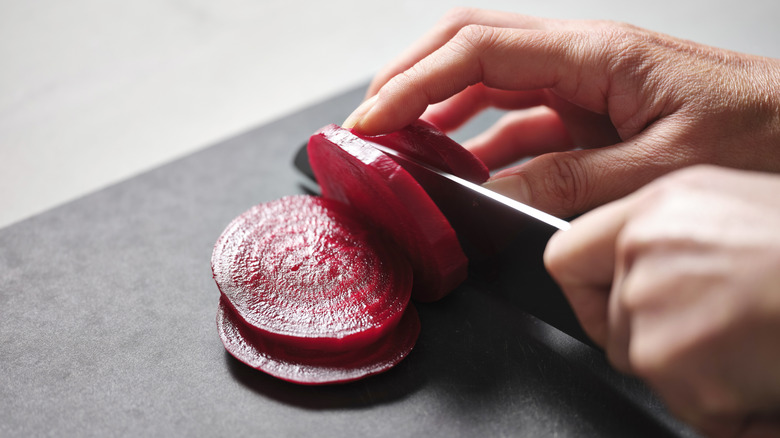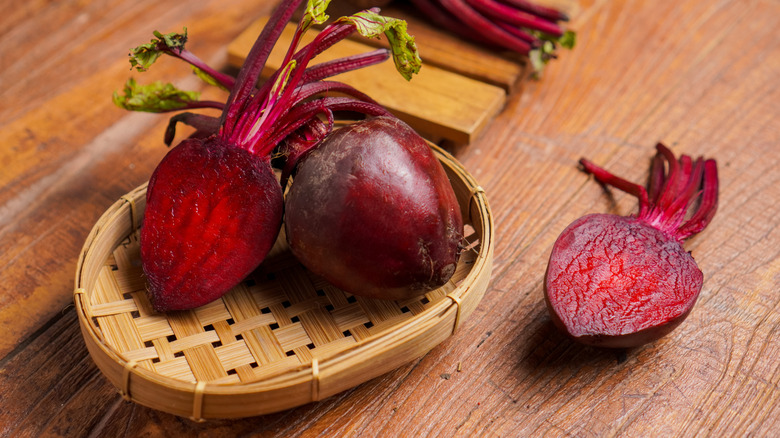If You Hate Beets, You Can Probably Blame Your Genetics
Chances are you either love beets or hate them, and if you're on the latter side, you really hate them. There doesn't ever seem to be much middle ground. It could be that you hate beets because they have a weird texture, especially when they're canned. Maybe you don't like them because their stains are so difficult to remove from cutting boards and clothing. But most likely, you don't like beets because you think they taste just like dirt.
For many, food dislikes come from a lack of exposure in childhood or a bad experience you just can't mentally shake. In the case of beets, however, it might have more to do with genetics. Science has recently discovered that certain olfactory-related genes cause people to be overwhelmed by the earthy notes in beets and some other root vegetables. So, it might not actually be your fault you hate beets, and it's possible to find ways to add them into your diet without cringing.
Some people are sensitive to the smells of geosmin and 2-ethylfenchol
Just as genetic tests can now tell if you're going to be a cilantro hater, studies show your genes can tell you that beets are icky. Even more surprising is that these beet-hater genes have more to do with smell than with taste. It all comes down to genetic mutations that alter a person's "smellscape." Humans have roughly 400 olfactory receptors, and some genetic markers make people more receptive to certain scents, such as those of 2-ethylfenchol and geosmin. If you can smell the wet earth in an unpleasantly intense way after a light rainfall, you might have those markers.
Let's just get this out of the way: Beets do not, in fact, taste like dirt because they are grown in the ground (unless they haven't been properly cleaned). Instead, they contain a substance called geosmin, which also exists in many earthy vegetables and soil. For certain people, their genes cause the smell of geosmin and sometimes 2-ethylfenchol (also present in beets) to be completely overpowering, especially when consumed. For those people, the smell is so strong that it impacts their ability to taste the sweet, enjoyable notes of the beet. Instead, they feel like they are crunching into a dirt clod. Some beets have more geosmin than others, and raw beets are especially rife with it. So, if you think that beet salad tastes like you're eating fresh sod, that's the reason why.
Beets are still worth eating
So you hate beets, and it's the fault of nothing but your genetics. That doesn't mean you should swear off beets permanently. To start, they're a low-calorie food with high antioxidant and anti-inflammatory properties, and they're incredibly nutritious and good for you. These root vegetables are very rich in folate and manganese, and they also contain vitamins C and B6, iron, and potassium. Some research even shows that beets are good for your heart, with regular consumption of them leading to improved cardiovascular health. Because of all this, it's worth learning how to make beets your friends.
There are a few ways you can prep beets in a way that makes them enjoyable. Because hatred of this veggie is so tied into smell, the best move is to overpower that scent with other flavors and pick varieties with low geosmin. Low-geosmin beets in powerful citrus or vinegar are a great place to start. Garlic is an incredibly strong-smelling and tasting ingredient, so making a garlic beet dip will give you a colorful condiment that doesn't overwhelm you with earthiness. Adding a little beet to fruit smoothies with tart berries can cut through the dirt smell and won't have that familiar beet texture. You can also fry them into seasoned chips — that way, the scent is nearly nonexistent, and the flavoring can be customized to your preferences. Experiment with strong ingredient additions, and you're bound to find something that works for you.


